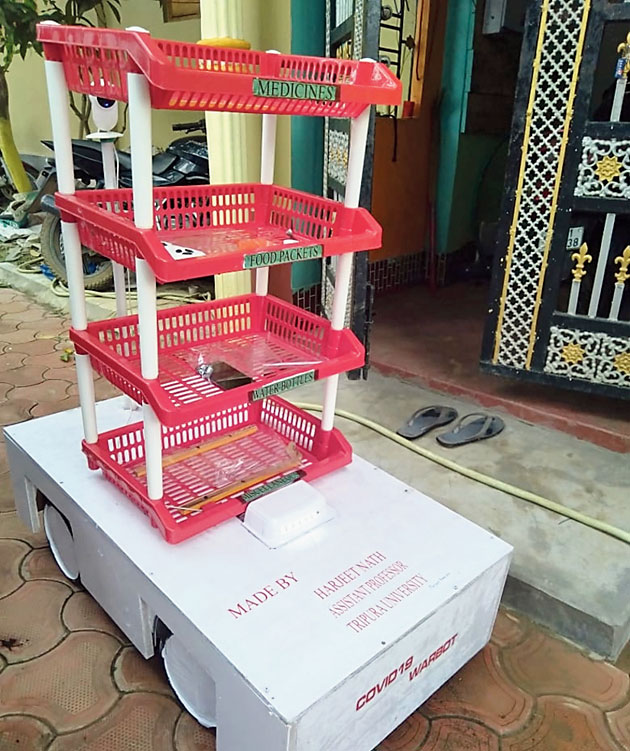An assistant professor of Tripura University has made a low-cost robot from scrap materials which he named “Covid-19 WARBOT” to reduce possibilities of contamination of frontline workers in hospitals while providing treatment to coronavirus positive patients.
Speaking to The Telegraph, Harjeet Nath of Tripura University’s chemical and polymer engineering department said the robot which he has devised can serve food, medicines and other essential items to the Covid-19 positive patients without human intervention.
He claimed that if the technique was applied, Tripura would be the first state in the Northeast to use robots at Covid-19 centres.
“This device will help doctors and nurses working in Covid-19 affected wards of our state by supplying food packets, medicines, and water bottles to the patients. An inbuilt camera with built-in microphone and speaker will act as a bridge between a patient and the medical staff who need not personally attend to the patient. It will also reduce chances of contamination during this pandemic,” Nath said.
He said that instead of donating funds to government’s relief funds, his invention would help medical professionals who treat patients by risking their lives.
Nath has developed this device using available spare parts including three motors, two rechargeable lead-acid batteries, transmitter and receiver, besides a USB output.
“In the robot, I have installed WiFi-controlled camera with an inbuilt microphone and speaker for communication directly with the doctors and that too, remaining at a safe place. It can reduce frequent visits of the medical staff to infected patients. By using a mobile phone or computer the medical staff can make direct contact with the patient. It took me at least a week to make the device for which I have spent nearly Rs 25,000,” he told this correspondent.
The robot can carry a load of around 15kg and its operating range is 20 metres. It can work continuously for nearly an hour as the total power of the rechargeable batteries is nearly 135 watt and it will take four hours to get charged.
The professor said his wife Sabita Nath had helped him while making the device and watching videos of the utilisation of robots in the Covid hospitals in different countries, Nath got the idea to make such a device in the northeastern state. Nath informed the state government about the “Covid-19 WARBOT” on May 15. However, he is yet to hear from them and is planning to apply for a patent very soon.
Medical superintendent of the state-run GB Pant Hospital, Ranjit Kumar Das, said Nath had not contacted the medical staff yet.
The robot may be used in the hospital but it will have to undergo a rigorous test by a technical expert committee, he added.











